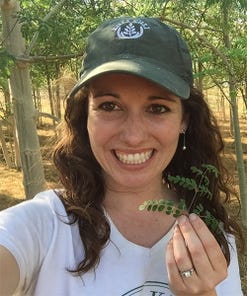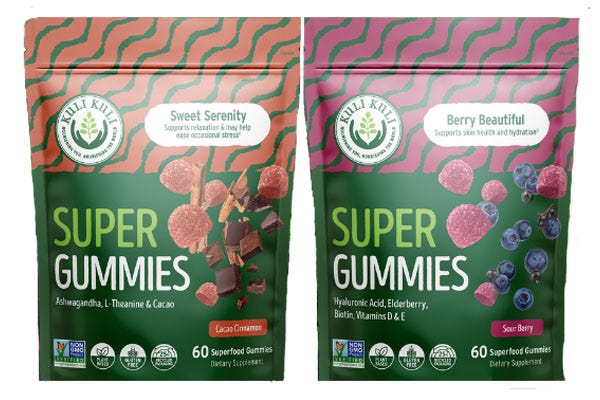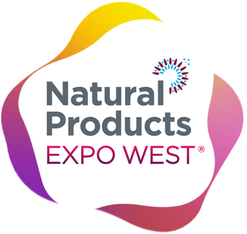Kuli Kuli Foods reaches new sales heights, expands beyond moringaKuli Kuli Foods reaches new sales heights, expands beyond moringa
After a decade of focusing on moringa, Kuli Kuli adds baobab, hibiscus and cacao to new product lines: gummies and blends. See what’s happening.
March 5, 2024

Lisa Curtis, founder and CEO of Kuli Kuli Foods, traveled the world with the hope of making it a better place.
Working in the Peace Corps in Niger, Africa, she realized the infinite power of moringa, an ingredient made from the “drumstick tree” that is known for its antioxidant and inflammatory properties.
“I was working in a very rural village where I was eating rice every day,” says Curtis, who is a vegetarian. “I was pretty tired and wanted to feel better.” While volunteering, some of the women told Curtis to eat moringa and showed her a fried peanut snack called kuli kuli that’s made with moringa leaves.
“It had an incredible impact on me,” Curtis says. “It made me feel energized.” High in protein, calcium and iron, moringa is a nutrient-dense superfood with 27 vitamins and 46 antioxidants. Medical News Today lists several benefits of moringa, with links to various studies supporting those benefits.
“It’s used medicinally in many cultures and in ayurvedic medicine,” Curtis says. “It’s called the miracle tree in many parts of Africa, especially in Senegal. It’s also called Mother’s Milk because it’s used a lot for lactation, in addition to so many other benefits.”
A study published in the Journal of Young Pharmacists touted moringa’s ability to support mood disorders. Other medical journals have reported that moringa leaves have been used for treatments in diabetes, edema, rheumatoid arthritis, asthma and malaria, as well as reducing the formation of kidney stones, stomach problems and high blood pressure—and even fighting staph infections. The Asian Pacific Journal of Cancer Prevention published a report that moringa can help treat and kill cancer cells.

Lisa Curtis, founder and CEO of Kuli Kuli Foods
“It almost does too many things,” Curtis says with a laugh. “You don’t want to sound like you’re selling snake oil, but yeah, it does a lot.”
Over the past decade, she’s grown California-based Kuli Kuli Foods into a superfood company known for its moringa powders and snacks sold in more than 11,000 stores nationwide, including Sprouts Farmers Market, Whole Foods, Walmart and Safeway.
Sales of Kuli Kuli grew 94% in the natural channel in 2023, compared to the previous year, according to SPINS, a wellness-focused data company. Within conventional channels, Kuli Kuli sales grew 28%, according to Nielsen. It’s the largest moringa company in the words, Curtis says.
“We’ve grown tremendously over the past year,” Curtis says. “Kuli Kuli is now a top five functional food brand at Whole Foods [Market] and Sprouts. We are the best-selling superfood at Walmart within our set.”
Kuli Kuli Foods is now expanding its lineup with four new superfood products, all made—for the first time—without moringa.
“We're finally at the point where we feel like we can use our platform to add in other sustainable community-grown superfoods like baobab and hibiscus and ethically sourced cacao,” says Curtis. “I think a lot of people are looking for functional superfoods.”
Curtis shared this news and more with New Hope Network.

What new products are you launching?
Lisa Curtis: We’re launching an amazing sour gummy made with organic baobab. If you’ve ever seen “The Lion King” it’s the tree that Rafiki (the monkey) hangs out in. It’s the world’s largest succulent and it’s so good at hydrating you. It’s the fruit from this baobab tree that has incredible skin health and hydration benefits.
What else are you launching?
LC: We’ve got a Sweet Serenity gummy made with ashwagandha, ethically sourced cacao and L-theanine. A lot of people don't know that cacao is one of the most naturally abundant sources of magnesium. So, it's actually great to take before bed.
What about the new blends coming out?
LC: We have two superfood blends. A bright pink, superfruit blend called Citrus C Defense that’s made with baobab, hibiscus and acerola cherry.
Marine Glow is a bright blue, seaweed mineral blend made with regeneratively farmed kelp, sea minerals and pineapple. People think seaweed tastes like ocean water, but it actually tastes delicious.
Why are you expanding the line-up?
LC: We’ve spent a lot of time thinking about what other plants our farmers are already growing alongside moringa that we can incorporate into our products. In doing so, we’re also providing these amazing functional plants to American consumers.
How much will this increase your product line?
LC: These four new products represent a dramatic 40% increase to our product line, bringing us to 14 products that will be sold in retail nationwide.
Are all of your products organic?
LC: Everything is organic except our gummies. It’s been really, really hard to find tapioca and pectin that are organic. We use as many organic ingredients as possible. All of the superfoods that we source are [USDA] certified organic. All of our powders are organic. Everything else is non-GMO or has a high percentage of organic.
How have you helped your farmers transition to organic and regenerative agriculture?
LC: Some of our suppliers weren’t certified organic. We worked with them to provide a loan upfront for them to get certified and then they paid us back with a moringa harvest after they got certified.
Now, we’ve been doing a fair number of small grants around regenerative agriculture.
How are you sourcing from regenerative farms?
LC: When you talk to a lot of our farmers, that’s just how you farm. You’re going to intercrop other plants to maximize the value and preserve the soil fertility. They’re growing organically. That soil health is their livelihood, and they want to maximize everything they can sell.
What’s the most important thing about Kuli Kuli that a lot of people don’t know?
LC: A lot of people don’t understand how hard it is to source directly from small farmers. Generally, people are working with large brokers or have lots of people in between. But we are sourcing directly with small farmers. And it is complicated. It means we have to be really cognizant of how the harvest is going, if there’s rainfall or it doesn’t rain.
How do you manage your supply chain?
LC: A lot of our crops come in short, so we often have to over-order products just to ensure that we have enough product to guarantee we won’t run out of stock on the shelf. That level of transparency and connection to the farm and soil is so important.
Is this a growing trend?
LC: We’re going to see more and more brands trying to do that because consumers really want to know: Where is this product being grown, what is the soil quality, how are workers being treated and what impact is this product having on the world around it?
What advice do you have to other founders who are going to Expo West?
LC: Expo is all about having lots and lots of conversations. It’s always such a popular trade show that lining up some of those meetings and conversations in advance is really key. Then you’re not scrambling to find somebody for a 10-minute touch base moment.
Afterwards, it’s all about the follow-up.
Why is the follow-up important?
LC: I am always surprised at how often people have wonderful conversations and forget to follow up. I think so much in the success is in the follow-up and keeping in touch.
Can you give an example?
LC: When I came out of the Peace Corps, I was 23 and had no experience in food. I started talking to investors. Most of the investors and retailers told me I was way too young and too small and this was never going to work. But I continued to keep them updated.
Then what happened?
LC: I have a list of 400 people who I keep updated on a quarterly basis at a pretty high level. I share what’s going well and some of our challenges.
When we were doing our Series B fundraising, an investor who I’d met five years ago and told me, “You’re not a fit for me” and never responded to any of my quarterly updates, responded and ended up putting in over a million dollars in that fundraising round, just because I continued to follow-up.
That’s amazing. It sounds like you have other examples, too.
LC: On the retailer side, it happened with Sprouts. We’ve been working with them for many years, talking to them. We had one product in there, which was doing well, but they never seemed really interested in new products. But we kept them updated.
When we launched our new gummies and blends, it really caught their eye. They told us “These are something we’re looking for, for our customers.” Believe it or not, they are launching five new Kuli Kuli products in July. That includes the new products we just launched, which will launch nationwide with Sprouts. It’s going to double our size in retail, all because we kept them updated.
All of my job success is because of the follow-up.
What’s your favorite Expo West favorite memory?
LC: Last year, I went with my 5-week-old, which sounds totally crazy. But I didn’t want to miss it. I drove down from northern California with my son and my mom, which was the only reason this was even possible.
New Hope actually gave him a badge that said “Chief Cuteness Officer.” It’s still one of my favorite mementos. I’m to show it to him some day when he’s old enough to understand.

Kuli Kuli will exhibit in Booth #N2121 in the Hot Products section of the Anaheim Convention Center. It will offer beauty boost and daily defense wellness shots at 10 a.m. Thursday, March 14. Natural Products Expo West, the leading trade show in the natural, organic and healthy products industry, begins March 12 at the Anaheim Convention Center in Anaheim, California. Click through for the agenda, registration, travel information and more.
Editor's note: The booth number has been corrected.
About the Author
You May Also Like





